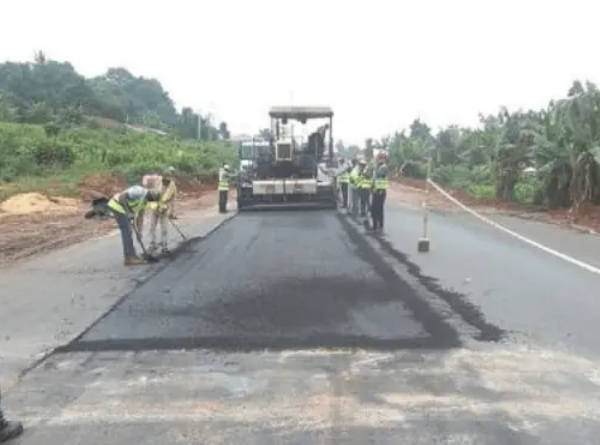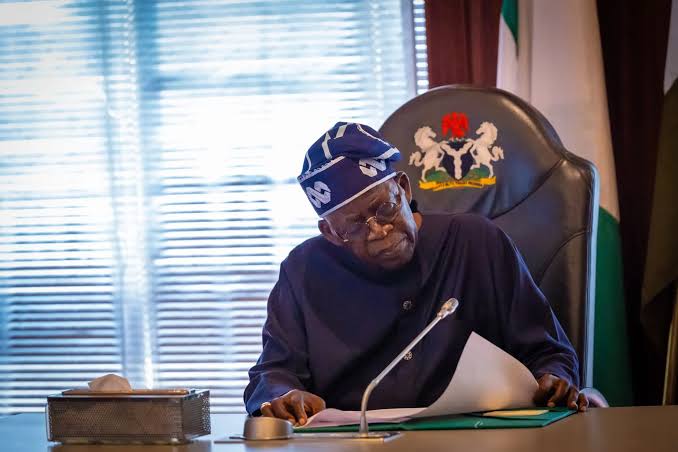News
FG Orders 37 Contractors To Deliver 260 Emergency Road Projects In 3 Months or…

…face termination
By Kayode Sanni-Arewa
The Federal Government has given about 37 contractors handling its 260 emergency road projects across the country three months to deliver, threatening failure to meet the deadline will result in contract termination.
Most of the defaulting contractors are handling emergency road projects in Yobe, Jigawa, Zamfara, Benue, Kogi, Abia, Anambra, Imo, Akwa Ibom, Bayelsa, Cross River and Rivers States.
It also reiterated it was not obligatory to pay mobilisation fees to contractors for emergency road projects.
The Minister of Works, David Umahi, stated these on Monday during a meeting with the contractors in his office.
In a statement by his Special Adviser on Media, Uchenna Orji, the Minister explained that this action became necessary because the Renewed Hope emergency road projects were funded through the 2023 Supplementary Budget to provide immediate intervention on critical, completely failed Federal roads nationwide.
Noting that the goal was to restore the serviceability of these roads, the Minister complained that the 37 contractors have made little to no progress since being awarded the contracts while warning that they must mobilize effectively to the site by Wednesday, July 10, 2024, or face contract termination.
“If after the deadline for mobilization to the site, any contractor fails to comply, the job shall be terminated by effluxion of time as the contract is for a time limit of 3 months.
“Any contractor whose job has stayed for more than 3 months without completion after the issuance of award letter must seek and obtain approval for extension of time from the Federal Ministry of Works,” he said.
The Minister warned the defaulting contractors that the projects awarded to them must be delivered within three months, adding that no excuse, including security challenges or lack of mobilization funds, will justify the delays causing road users to suffer.
He asserted that contractors that failed to meet the deadline will be blacklisted for hindering the Renewed Hope administration’s efforts to revolutionize road infrastructure for Nigeria’s economic prosperity.
He said: “The people are suffering, the President is having sleepless nights in his efforts to fix our road infrastructure to help our economy, and people will be given jobs and they are telling us stories.
“There have been jobs awarded by this Ministry in the past and money paid, and the contractors would hold the money, and they would say it’s a security problem
“Didn’t you know about the security situation before you got the job?”
Regarding mobilization fees, the Minister stated that under the Standard Conditions of Contract, mobilization funding is not a prerequisite for contractors to begin work on-site.
According to him, it is at the Ministry’s discretion and will only be provided to contractors who commit, through an affidavit, to complete the job within three months of mobilization.
“Our new policy is that if you want mobilization and we are happy to give you, you will abide by the conditions. One is that there will be no review of any component of the mobilization given.
“Two, we will give you 30% and you will do 30% of the work before we can give you another money. So please, mobilization is not compulsory. Is that clear? Again, emergency projects are not mobilized.
“The rule is that in emergency projects, you will go and do it 100%, and then you submit your papers.
“We now pay you 80% and send your documents to BPP. When they approve, we pay you the balance of 20%,” he noted.
The Minister also directed the Federal Controllers of Works to ensure proper supervision of projects in their sites and be abreast with the contract awarded, amount, date of award, timeline, review date, extension of time, argumentation granted and whether the contractor is on site.
News
Budget defense: Senators hammer ministers, top civil servants

Top shots in the executive arm of government, like the Minister of Finance and Coordinating Minister of the Economy, Mr Wale Edun, the Director General of National Orientation Agency ( NOA) Mallam Lanre Issa – Onilu and his counterpart in the News Agency of Nigeria ( NAN) , Ali Mohammed Ali , were separately put under fire in the Senate during 2025 budget defence sessions .
While the Minister of Finance , Wale Edun and the Minister of Budget and Economic planning , Senator Atiku Bagudu were put on hot seats by the Senate Committee on Appropriation, the DG of NOA and that of NAN , had very tough encounters with the Senate committee on Information and National Orientation .
Trouble came the way of the Minister of Finance when barrage of questions were fired at him by some members of the Appropriation committee on state of implementation of the 2024 budget , particularly the capital component .
Specifically , Senator Abdul Ningi ( PDP Baichi Central) , in the barrage of questions fired at the Minister , asked him to explain how proceeds from fuel subsidy removal were expended in the 2024 fiscal year .
” What is the budget performance achieved so far , for 2024 fiscal year , particularly in terms of the capital expenditure.
See also FG Approves Loans to Bolster Financial Position
We haven’t heard from the Minister how much has been saved from the removal of fuel subsidy and how much has been expended .
“We also haven’t heard from the Ministers about the debt servicing. How much have we actually used to service our debt in 2004?
” How much are we expecting to service the debt in 2005? Finally ,will the Minister of Finance guarantee that the extension of the capital component of the 2024 budget to June 30, 2025 will give the desired results in terms of implementation that has a very low percentage now ? ”
Apparently unsettled by the question , the Minister hurriedly requested the committee to accord him a close door session for detailed response to the question .
” Are we in a closed door session ? If we are not in a closed door session , i will humbly seek for that for detailed explanations on the questions asked “, he said .
The Committee Chairman , Senator Solomon Olamilekan ( APC Ogun West ) , according asked journalists to excuse them for the closed door session.
Earlier at the budget defence session the Senate Committee on Information and National Orientation had with agencies under its purview , the Director General of National Orientation Agency ( NOA) , Mallam Issa – Onilu and his counterpart in the News Agency of Nigeria ( NAN) Ali Mohammed Ali , were ordered to re – draft and re – present their budgetary proposals for 2025 fiscal year .
The committee chaired by Senator kenneth Eze ( APC Ebonyi Central), tackled the NOA DG on the National Identity Project being implemented by the Agency by saying the project is not known to Nigerians , particularly, those residing at the grassroots .
But the NOA DG , held his ground by telling the committee members that the project is very necessary in putting in place , the right value system .
” The challenge we have about value system is about National Identity which is very necessary at galvanising Nigerians for Nation building , national development and growth “, he said .
The Committee however insisted that he should go back for re – drafting programmes of the agency to be captured and appropriated for , in the 2025 fiscal year .
Similar fate also befell the Director General of News Agency of Nigeria ( NAN) , who was told to go and reconcile disnointed figures presented in the 2024 budget implementation before coming for appropriation of projected figures for 2025 fiscal years .
News
Teacher remanded in prison for assaulting 3-year-old child

An Ogba Chief Magistrate’s Court in Lagos State has ordered that a 45-year-old primary school teacher, Stella Nwadiggbo, be remanded at a correctional facility for allegedly assaulting a three year old primary school pupil in the Ikorodu area of the state.
The teacher was caught on camera slapping the three year old child in class. The video of the teacher assaulting the child had gone viral.
She was consequently arrested and detained by the Family Support Unit (FSU) of Ikorodu Police Division.
The Lagos State Police Public Relations Officer, Benjamin Hundeyin, who confirmed the latest twist stated that Stella Nwadigbo, aged 45, was arraigned on the orders of the State Commissioner of Police, Olanrewaju Ishola, for indecent treatment and assault of a child.
Hundeyin stated that the accused was arraigned, on Thursday, at a Magistrate’s Court 1, Ogba.
He stated that the accused had been captured in a viral video indecently treating and assaulting a three-year-old pupil of a primary school in Ikorodu area of Lagos State.
“Following receipt of the video, the Family Support Unit (FSU) of Ikorodu Police Division promptly arrested the suspect on Wednesday, January 8, 2025 and transferred her to the Gender Unit of the Command Headquarters same day after preliminary investigations. The victim was taken to a medical facility for adequate medical attention.”
“The suspect has since been remanded to Kirikiri Correctional facility till February 18, 2025 when the case comes up for continuation of hearing” he added.
Hundeyin further stated that the Commissioner of Police, Lagos State Command, commended Nigerians for promptly alerting the police to the situation also, assured them of the ever-readiness of the Command to respond quickly and appropriately to situations towards ensuring the safety and security of resident and visitors to Lagos State.
News
VIDEO; Nigeria’s foreign relations: So far, Tinubu has showcased good salesmanship-Dr Nwambu

… but we’re yet to feel the impact now
Director General of Centre for Credible Leadership and Citizens Awareness CCLCA, Dr Gabriel Nwambu has said President Bola Tinubu has showcased excellent salesmanship globally but Nigerians are yet to feel the impact.
Nwambu disclosed this in a chat with TVC where he outlined Tinubu’s moves so far in international relations.
Watch video below:
-

 News24 hours ago
News24 hours agoNigeria Won’t Break Ties With France Over Niger, Others
-

 News24 hours ago
News24 hours agoPortugal Football Club Signs on 19-Year-Old Nigerian- born Footballer, Yaqub Usman-Malah
-

 News20 hours ago
News20 hours agoAfter firing 27 officers with itchy fingers, EFCC reportedly loses over $350k, jewelries
-

 News24 hours ago
News24 hours agoYouth Confab Is A Plan To Compensate Seyi Tinubu’s Friends, Not Nigerian Youths – Sowore
-

 News24 hours ago
News24 hours agoCourt jails man seven years for stealing phone
-

 Metro16 hours ago
Metro16 hours agoTwo Sisters Arrested For Setting Father On Fire After Rape
-

 Metro16 hours ago
Metro16 hours agoAnambra Catholic Priest Resigns, Becomes Native Doctor
-

 News20 hours ago
News20 hours agoJust in: FG Endorses Telcos Tariff Increase








